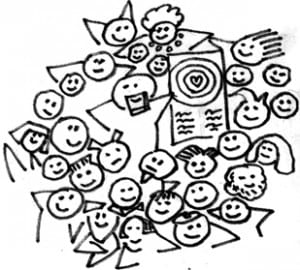
As futurists predicted, corporate social responsibility programs are growing faster than economic recovery. Most participating enterprises are seizing this opportunity to enhance their competitive advantage in the market place by flexing their charitable muscles. With savvy consumers basing buying decisions on a company’s contribution to its community, corporations are beginning to take heed, and the ROI (return on investment) for both corporation and community can finally begin to move toward balance.
However, social responsibility entails much more than courting a charitable organization to become a corporate mascot — which is what we often witness. Social responsibility is “the idea that businesses should not function amorally, but instead should contribute to the welfare of their communities.” It is relationship and community building. It is recognizing that no one is alone on this planet nor wants to be and that none of us can reach our potential without the involvement and fulfillment of others. Rev. King’s words are as true today as they were when he first spoke them.
. . . today our very survival depends on our ability to stay awake, to adjust to new ideas, to remain vigilant and to face the challenge of change. The large house in which we live demands that we transform this world-wide neighbourhood into a world-wide brother [and sister] hood. Together we must learn to live as brothers [and sisters] or together we will be forced to perish as fools. Rev. Dr. Martin Luther King, Jr.
Although much foolishness is playing out on the world stage — military oppression, genocide, poverty — we also see the rise of social entrepreneurialism and communities of passion. Social entrepreneurialism is the essence of social responsibility. Communities of passion are social enterprises or neighbourhoods or groups formed by people sharing common values and pursuing a purpose for which they feel passion. Communities of passion universally motivate through caring for others’ as well as their self-interests. These communities support individual strengths while encouraging inclusive and experiential processes that allow for experimentation, failure, learning and growth. One example, Socio-Technical Systems Roundtable particularly lives these practices through its Discovery Process.
Why do communities of passion matter?
Organizations that understand how to recognize, create, and empower communities of passion will be able to leverage passion as a multiplier of human effort. Only when people are passionately engaged in their work, when they feel like they are a part of something larger than themselves, will the organization reach its true innovative potential. The Management Exchange
Engaging people’s passions is more than a corporate responsibility. It is the responsibility of every person on the planet to contribute to society. In our neighbourhoods, it might be something as simple as protecting the trees, planting a garden to beautify the boulevard, shoveling boulevard sidewalks so the elderly can walk safely or providing another set of eyes to ensure safe play time for children in the park. In our individual lives, it means taking the time to discover our passion and purpose and then sharing them with others.
For what do you hold passion? If you were living up to your true potential, what would you look and feel like? What activities would you spend your time doing? What people would surround you?




